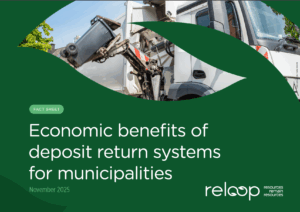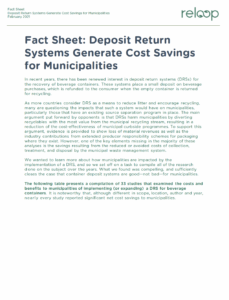Across the world, beverage container waste is a growing challenge. Billions of plastic bottles, aluminium cans and glass bottles are discarded each year, with many ending up in landfills, incinerators or as litter.
For local governments, the consequences are both financial and environmental: waste management expenses are rising, landfill space is shrinking, and the public demand for long-term, sustainable solutions is stronger than ever.
In this fact sheet, we explore deposit return systems as both an environmental solution and a smart financial investment that delivers tangible returns for local authorities and their communities.
The analysis builds on our 2021 publication, compiling insights from over 45 studies published in the last 20 years (2005-2025), across more than 20 regions.
The result is a current and comprehensive view of the many ways that a deposit system could generate real economic value for local authorities responsible for managing waste.
-

Economic benefits of deposit return systems for municipalities
This fact sheet explores the economic benefits of deposit return systems as both an environmental solution and a smart financial investment for local authorities and their communities.
Related resources
2021 fact sheet
-

Deposit Return Systems Generate Cost Savings for Municipalities
We wanted to learn more about how municipalities are impacted by the implementation of a DRS, and so we set off on a task to compile all of the research done on the subject over the years. What we found was compelling, and sufficiently closes the case that container deposit systems are good—not bad—for municipalities.